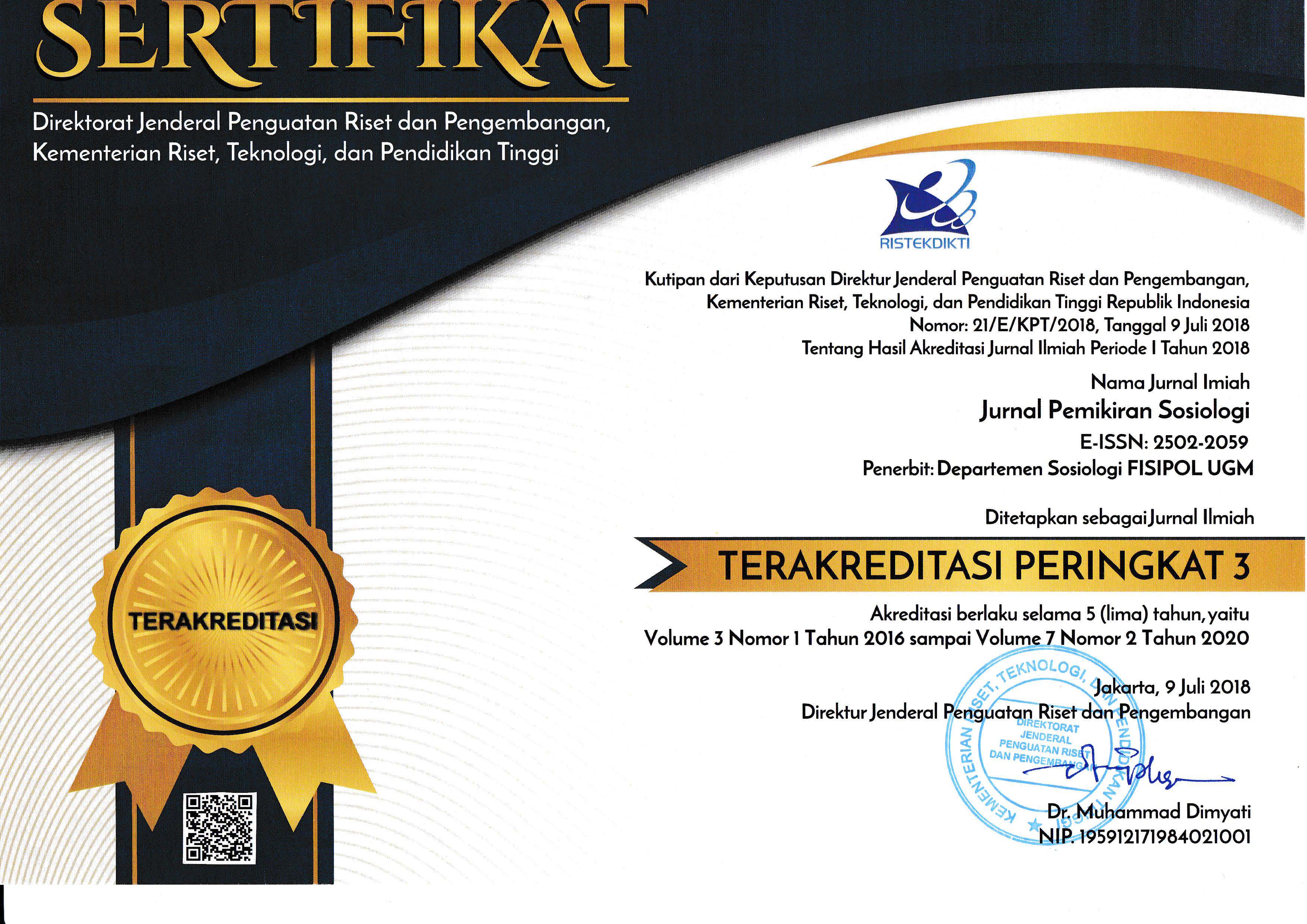Dualitas Peran Pembangunan Korporasi: CSR dalam Kerangka Kebijakan PROPER dan Lanskap Sosial Pemanfaat Program
Muhamad Arifin(1*)
(1) Universitas Indonesia
(*) Corresponding Author
Abstract
Studi ini bertujuan mengeksplorasi sudut pandang sosiologis gagasan Giddens
tentang dualitas struktur untuk mengkaji CSR korporasi (Corporate Social
Responsibility) dan komunitas pemanfaat dibawah kebijakan pemerintah Proper.
Studi terdahulu tentang CSR menunjukkan sebuah dikotomi antara struktur dan
agensi yang meninggalkan sebuah kehampaan pada praktik CSR dalam konteks
pembangunan. Oleh karena itu, studi ini berfokus pada relasi antara kebijakan
Proper dianggap sebagai struktur dan komunitas pemanfaat CSR melalui berbagai
bentuk agensi yang belum banyak mengemuka. Unit analisis terdiri dari sebuah
korporasi di sektor hilir industri migas dan komunitas pemanfaat program CSR
yang berlokasi di Provinsi Sumatera Selatan. Studi ini menerapkan pendekatan
kualitatif yaitu observasi, wawancara terstruktur, dan wawancara mendalam.
Informan kunci yang terlibat yakni petugas senior bidang CSR, petugas
pemberdayaan komunitas, elit aktor komunitas, dan kelompok komunitas
pemanfaat program CSR. Hasil studi ini menekankan peran signifikan para elit
lokal komunitas dalam menentukan keberlanjutan program CSR. Sebagai
kesimpulan, analisis dualitas struktur Giddens mampu menggambarkan proses
dinamis dalam relasi yang saling mempengaruhi antara peran korporasi dan
komunitas pada praktik CSR dalam kerangka kebijakan Proper. Sejumlah aspek
berdampak sangat konstruktif. Namun, terdapat aspek lainnya yang belum
mengarah pada keberlanjutan program CSR korporasi.
Keywords
Full Text:
PDFReferences
Banks, Glenn, Regina Scheyvens, Sharon McLennan, dan Anthony Bebbington. 2016. “Conceptualizing corporate community development.” Third World Quarterly, 37(2):245-263.
Creswell, John W. 2014. Research Design: Qualitative, Quantitative, and Mixed Methods Approaches 4th Edition. Sage Publications.
Gardner, Katy. 2015. “Chevron’s gift of CSR: moral economies of connection and disconnection in a transnational Bangladeshi village.” Economy and Society 44(4):495–518.
Giddens, Anthony. 1984. The Constitution of Society: Outline of the Theory of Structuration. Cambridge: Polity Press.
Gunawan, Daddi H. 2014. Perubahan Sosial di Pedesaan Bali: Dualitas, Kebangkitan Adat, dan Demokrasi Lokal. Tangerang Selatan: Penerbit Marjin Kiri.
Gupta, Sanjeev dan Nidhi Sharma. 2009. “CSR - A Business Opportunity.” Indian Journal of Industrial Relations 44(3):369-401.
Hadi, Sudharto P. dan Bulan Prabawani. 2020. “CSR’s Performance of Gold Proper Corporates in Indonesia”. Journal of Economics and International Business Management, Vol. 18, No. 1, pp. 21-29.
Hermawan, Marko S. dan Stephanie G. Mulyawan. 2014. “Profitability and Corporate Social Responsibility: An Analysis of Indonesia’s Listed Company.” Asia Pacific Journal of Accounting and Finance, Vol. 3 (1), pp. 15-31.
Hilarius, Yosef dan Yusup Ridwansyah. 2020. “A Symbolic Participation of the Local Community in the Implementation of A PROPER-based Corporate Social Responsibility Program”. Jurnal Sosiologi Masyarakat, 25(1):1-25.
Layder, Derek. 1994. Understanding Social Theory. Sage Publications.
McEwan, Cheryl, Emma Madwsley, Glenn Banks, dan Regina Scheyvens. 2017. “Enrolling the private sectore in community development: magic bullet or sleight of hand.” Development and Change 48(1):28-53.
McLennan, Sharon dan Glenn Banks. 2018. “Reversing the lens: Why corporate social responsibility is not community development.” Corporate Social Responsibility and Environmental Management, march 2018 1-10.
Neuman, Lawrence W. 2014. Social Research Methods: Qualitative and Quantitative Approaches 7th Edition. Pearson Education Limited.
Ortner, Sherry B. 2006. Anthropology and Social Theory: Culture, Power, And The Acting Subject. Duke University Press.
Prayogo, Dody. 2011. “Evaluasi Program Corporate Social Responsibility dan Community Development pada Industri Tambang dan Migas.” MAKARA, Sosial Humaniora, 15(1):43-58.
Prayogo, Dody, Muhammad Irvan, Yosef Hilarius, dan Sakti Wira Yuda. 2013. “Development of A Guideline For The Implementation and Assessment of Mining, Oil, and Gas CSR Programs In Indonesia.” European Journal of Business and Management 5(1) 100-109.
Prayogo, Dody dan Yosef Hilarius. 2012. “Efektivitas Program CSR/CD dalam Pengentasan Kemiskinan: Studi Peran Perusahaan Geotermal di Jawa Barat.” Jurnal Sosiologi MASYARAKAT, 17(1):1-12.
Rashed, Abdulkarim Hasad dan Afzal Shah. 2021. “The role of private sector in the implementation of sustainable development goals.” Environment, Development, and Sustainability, 23:2931-2948.
“Rio+20 United Nations Conference on Sustainable Development: The Future We Want.” 2012. Perserikatan Bangsa-Bangsa (PBB). Diakses pada 6 Februari 2022.
(https://sustainabledevelopment.un.org/content/documents/733FutureWeWant.pdf)
Ritzer, George. 2008. Modern Sociological Theory 7th Edition. McGraw-Hill Higher Education.
Rustinsyah. 2016. “The Impact of Cement Company’s CSR Programmes on the Lifestyle of a Rural Community: A Case Studi in the Ring 1 Area in Tuban, East Java, Indonesia.” International Journal of Sustainable Development & World Ecology, Vol. 23, No. 6, pp. 493-503.
Sabine, Luning. 2012. “Corporate Social Responsibility (CSR) for Exploration: Consultants, Companies, and Communities in Processes of Engagements.” Resource Policy, Vol. 32, Pp. 205-211.
“Strategy for Working with the Private Sector.” 2012. United Nasional Development Programme (UNDP). Diakses pada 27 Januari 2022.
Summers, Gene F. 1984. “Economic Development and Community Social Change.” Annual Review of Sociology, Vol. 10, Pp. 141-166.
“Transforming our world: the 2030 Agenda for Sustainable Development.” 2015. Perserikatan Bangsa-Bangsa (PBB). Diakses pada 27 Januari 2022.
Waluyo, Bambang dan Pujiyono. 2017. “The Model of Sanctions for Violators of Corporate Social Responsibility (CSR) (Study in Indonesia).” International Journal of Applied Business and Economic Research, Vol. 15, No. 15, pp. 299-312.
Wilson, Akpan. 2006. ‘”Between Responsibility and Rhetoric: Some Consequences of CSR Practice in Nigeria’s Oil Province.” Development Southern Africa 23(2):223–40.
Article Metrics
Refbacks
- There are currently no refbacks.
Copyright (c) 2022 Jurnal Pemikiran Sosiologi

This work is licensed under a Creative Commons Attribution-ShareAlike 4.0 International License.
Jurnal Pemikiran Sosiologi Indexed by:
ISSN 2252-570X (Print), ISSN 2502-2059 (online).

















